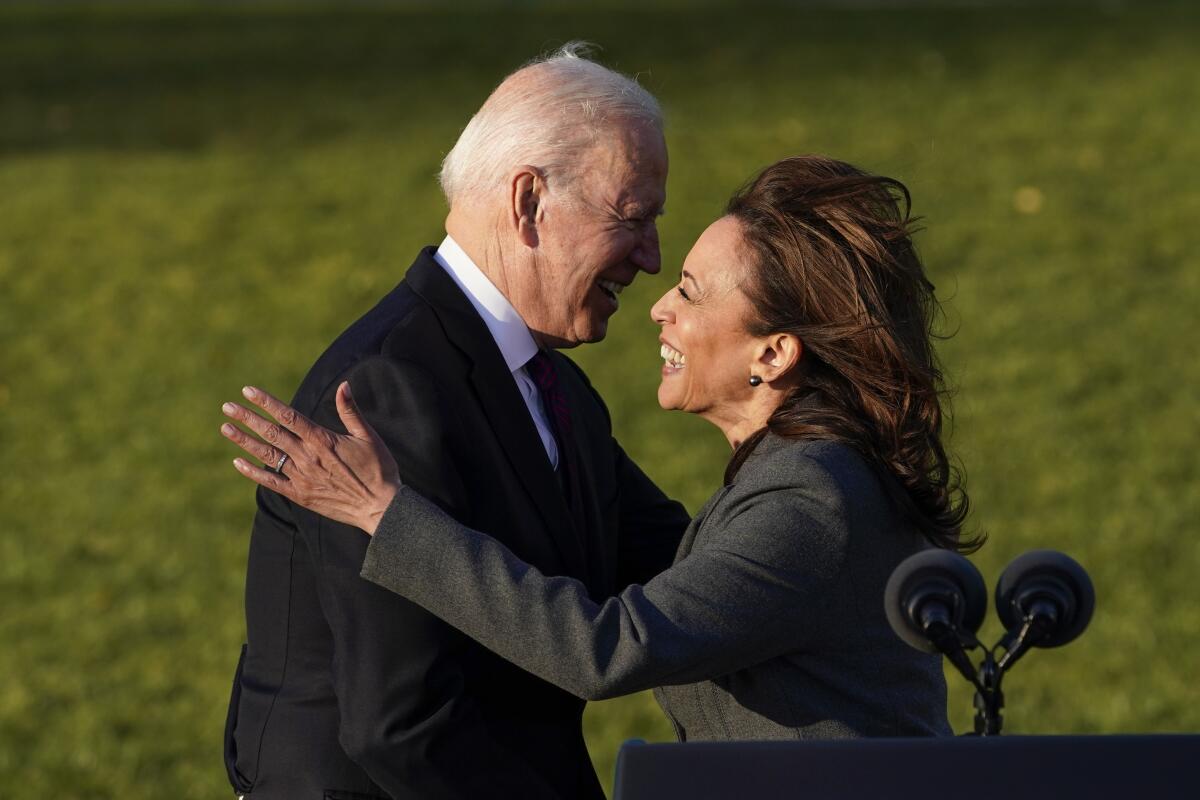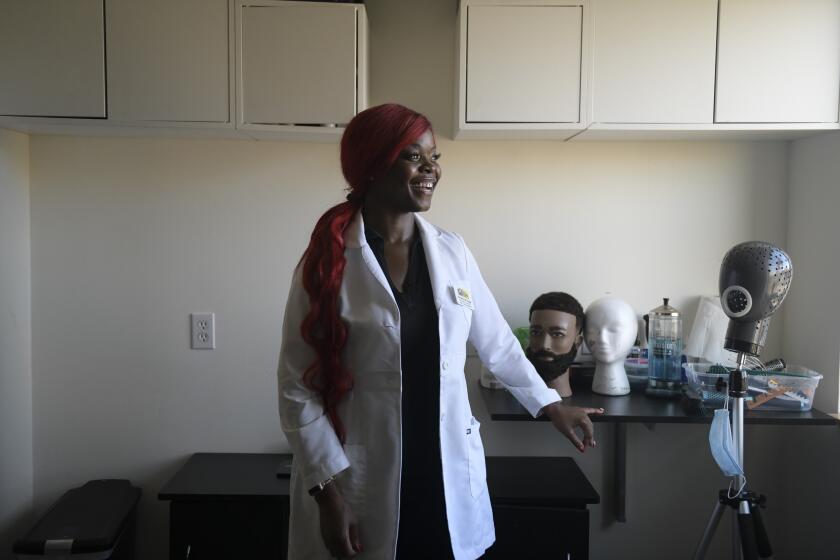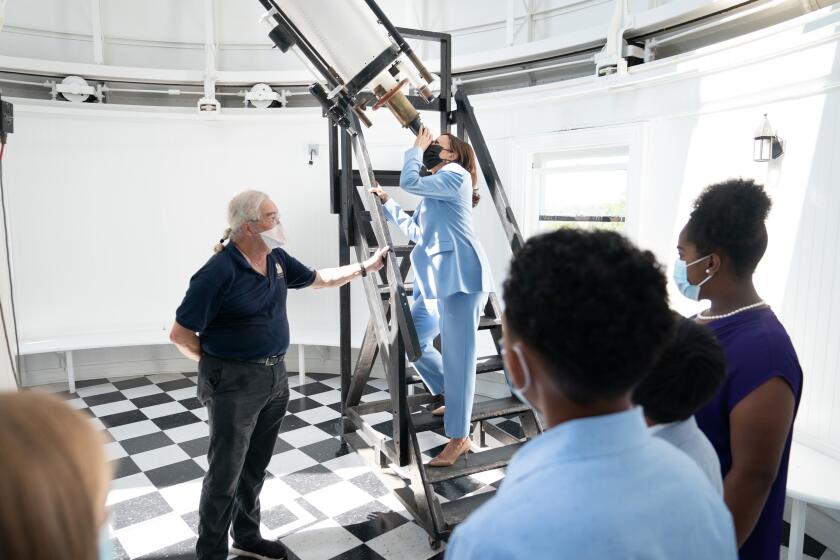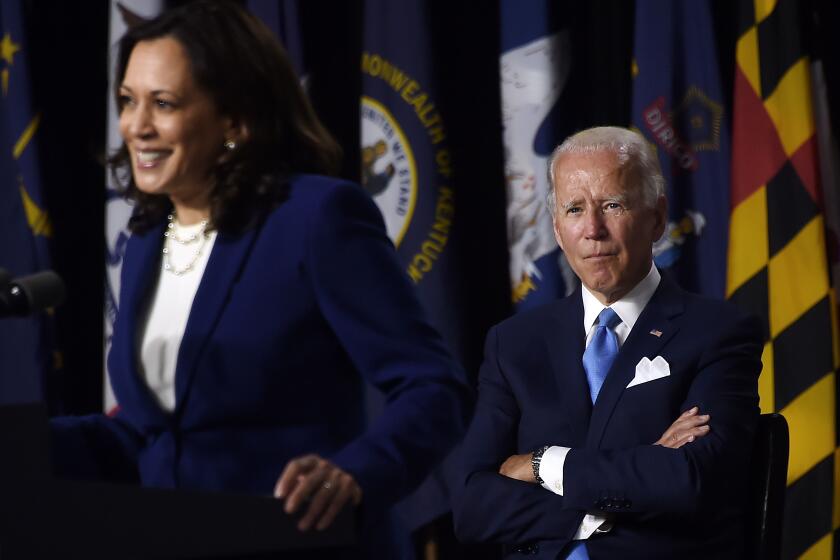As Kamala Harris takes criticism, Democrats in a bind as they look to 2024 and 2028

- Share via
When Joe Biden chose Kamala Harris as his running mate last year, some Democrats said they believed he was naming an eventual successor who could replace him as soon as 2024 and give better representation to the party’s core constituencies: women and people of color.
Ten months into the new administration, the perception that Biden was anointing Harris has become a source of tension among Democrats, as growing worries over Harris’ political stature collide with concerns that any move to sideline her would alienate the voters needed to win elections and undercut the party’s promise of equity.
Biden, who turns 79 on Saturday, and Harris are slipping in public opinion polls, and the vice president is facing a new wave of criticism about public gaffes and internal dysfunction in her office, pushing the question into sharper focus.
“His nod to wanting to select a woman and ultimately selecting a Black woman was a nod to his creating a runway to a succession plan,” said Glynda Carr, president of Higher Height, a political nonprofit that seeks to elevate Black women to elected office.
Biden suggested as much when he introduced Harris as his running mate, in an August 2020 news conference, as someone who could inspire little girls, “especially little Black and brown girls, who so often feel overlooked and undervalued.”
“Today, just maybe, they’re seeing themselves for the first time in a new way,” he continued, “as the stuff of presidents and vice presidents.”
After Christine Paige met the vice president, her life changed in unexpected ways, showing how, in an era when the definition of celebrity is looser than ever, fame can be experienced in micro-doses.
If Democrats turn their back on that promise in the face of what she views as sexism and racism, Carr said, they will be undermining “literally the foundation for a winning coalition for Democrats. ... Black women voters who have delivered time and time again as the margin of wins for presidential elections.”
But many leading Democrats are increasingly public in their belief that Harris, the first woman to be vice president as well as the first Black and Asian American person, will not come into the next nominating race as the prohibitive favorite. They argue in favor of a wide-open primary geared toward finding a general election winner above all else. Transportation Secretary Pete Buttigieg is often mentioned as a potential contender, but Democrats expect others will emerge as they did in the crowded 2020 field, which also included Harris.
“There’s going to be a battle for it, and I think that’s very healthy,” said former Sen. Barbara Boxer, a California Democrat who preceded Harris in the Senate and shares her San Francisco political base.
As a measure of how Harris’ standing has fallen since she and Biden were elected, Boxer stopped short of calling her a front-runner for the next nomination.
“Of course, the sitting vice president is going to be absolutely in the mix if she wants to be,” Boxer said, echoing comments of former Connecticut Sen. Christopher Dodd, who told the New York Times this month that Harris would be on “a short list” by virtue of her job title.
Jennifer Palmieri, communications director in former President Obama’s White House and Hillary Clinton’s 2016 presidential run, said Black and female Democrats will be the dominant force in choosing the next nominee, whether Harris or someone else, given their status in the party.
“It’s in their power to deliver the nomination,” she said.
The video with Kamala Harris and a group of child actors is the second time recently that she’s had a seemingly innocuous appearance turn troublesome.
Though many Black and female voters are rooting for Harris’ success, it’s far from certain they will back her uniformly. Harris dropped out of the 2020 primary after failing to build a base in a large field that included women and Black candidates. Biden pulled ahead in South Carolina with a boost from Black voters, many of whom said they were making a pragmatic choice about who was best suited to defeat then-President Trump, who has teased another run.
Boxer said the potential backlash among Harris’ supporters would be outweighed by the imperative to win.
“Some people always feel that way about their candidate regardless of who it is,” Boxer said of potential resentment. “But I think the overwhelming number of people all across our diverse party want to win because the stakes are so high, and now what we’re seeing post-Trump, is exactly how high they are to democracy itself.”
Harris’ supporters say it’s too early to stage a fight. She’s less than a year into her first term in a job that is always politically challenging and trying to quash any speculation that she is anything but a team player.
On Thursday, when Harris was asked in an ABC News interview whether she had discussed 2024 with Biden, she said “absolutely not.”
Biden remains the presumptive nominee in 2024. And the administration argues that Biden, having signed a major infrastructure bill into law this week, is close to achieving another major piece of his agenda, a generational climate and social welfare bill that could help rebuild his political momentum.
“No one started talking about Al Gore clearing the field — or running — until after the 1998 midterms,” the final two years of Bill Clinton’s second term, said Donna Brazile, a Harris confidant who led Gore’s 2000 presidential campaign, which ended in a loss to George W. Bush.
“She’s got to get the midterms under her belt before she can start looking past tomorrow, but for right now she’s governing,” Brazile said.
Nevertheless, Democrats are worried. Some are privately discussing what veteran Democratic strategist Paul Maslin called an “extremely worrisome” problem for the party as it contemplates Trump’s potential return. The party’s loss this month in the Virginia governor’s race — a blue-leaning state that is normally seen as a bellwether — has further heightened anxiety ahead of next year’s midterm election, where the party in the White House almost always loses congressional seats.
“It’s open panic,” said another Democratic operative who would not use his name for fear of alienating the administration, adding that some party activists worry Harris doesn’t have the political skills to navigate such difficult times.
The nature of the vice presidency, as loyal lieutenant, gives her little room to maneuver to boost her own profile.
The White House has branded itself as the ‘Biden-Harris’ administration, but the two, once inseparable, are now spending more time apart.
Harris has also been tasked with handling some of the most controversial and intractable issues facing the administration — deterring migration from Central America and countering Republican attempts to restrict voting access. The voting bill is stalled in the Senate, and the number of people stopped trying to enter the country illegally set a record high of 1.7 million in the budget year that ended Sept. 30.
Some of her supporters say that such assignments will make it hard to notch the kind of political victories needed to win over voters.
“They could be assigning her things that would be more helpful to their objectives. She’s up to it. Smart, hard-working and a legal maven,” said California’s lieutenant governor, Eleni Kounalakis, a Democrat and ally.
Throughout history, vice presidents have usually been seen as next in line for the office if their ticket wins a second term. But Biden’s age, questions about whether he will seek reelection and his administration’s struggles have put unusual pressure on Harris. So does the barrier-breaking nature of her vice presidency, which saddles her with both high expectations and the added burdens of sexism and racism.
Jean Hessburg, a prominent Democratic activist in the early nominating state of Iowa, said the speculation so early in Harris’ tenure was proof of an “abhorrent” double standard that “ought to send shivers down the Democratic Party’s spine.”
“My hope is that we female voters absolutely understand what’s at stake and will be unforgiving in our response,” she said.
Vice presidents almost always poll worse than presidents. But Harris lags all four of her most recent predecessors at this point in their tenures, according to a Times analysis.
Her average approval rating generally lags a few points worse than Biden’s — 41% of voters approve of the job she is doing. Their approval ratings have been battered by the persistent COVID-19 pandemic, inflation and the chaotic withdrawal in August from Afghanistan.
Roshni Nedungadi, a partner at HIT Strategies, a Democratic polling firm that specializes in research on women, young voters and people of color, said Harris’ approval ratings have decreased among core constituencies, including voters younger than 30 and Black voters, with significant numbers unsure of how they view her.
“Something we hear from them every week is they just don’t know what she’s doing,” Nedungadi said. “For the first few months, they were willing to give her the benefit of the doubt.”
But more recently, he said, “why hasn’t she been more front and center?”
More to Read
Get the L.A. Times Politics newsletter
Deeply reported insights into legislation, politics and policy from Sacramento, Washington and beyond. In your inbox three times per week.
You may occasionally receive promotional content from the Los Angeles Times.















